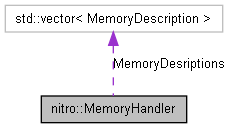#include <utilities/memory_handler.h>

Public Member Functions | |
| template<class stored_type > | |
| stored_type * | Allocate (PointerInterface *Ptr, const std::size_t ItemCount, const std::string &BlockDescription="") |
| template<class stored_type > | |
| void | Deallocate (stored_type *DeallocatingData) |
| template<class stored_type > | |
| void | Copy (stored_type *&Ptr1, stored_type *&Ptr2) |
Private Attributes | |
| std::vector< MemoryDescription > | MemoryDesriptions |
Detailed Description
Class stores information about all allocated memory blocks.
Definition at line 219 of file memory_handler.h.
Member Function Documentation
| stored_type * nitro::MemoryHandler::Allocate | ( | PointerInterface * | Ptr, | |
| const std::size_t | ItemCount, | |||
| const std::string & | BlockDescription = "" | |||
| ) |
Function allocates memory block.
- Parameters:
-
Ptr - . ItemCount - . BlockDescription - Description of the allocated memory block.
- Returns:
- Pointer on the allocated memory block.
- Exceptions:
-
nitro::exception Can throw exception of this type. It contains a description of the error and error code.
Definition at line 347 of file memory_handler.h.
References nitro::exception::code(), MemoryDesriptions, and nitro::exception::what().
{
try
{
stored_type * Ptr( new stored_type[ ItemCount ] );
for( std::size_t i( 0 ) ; i < MemoryDesriptions.size() ; i++ )
{
if( MemoryDesriptions[ i ].AddressIn( PtrI ) )
{
MemoryDesriptions[ i ].RegisterPointer( PtrI );
}
}
MemoryDesriptions.push_back( MemoryDescription( ( void * )Ptr , sizeof( stored_type ) * ItemCount , BlockDescription ) );
return( Ptr );
}
catch( nitro::exception e )
{
throw( nitro::exception( std::string( "MemoryHandler::Allocate( PointerInterface * PtrI , const std::size_t ItemCount , const std::string & BlockDescription /* = "" */ )::" ) + e.what() , e.code() ) );
}
catch( ... )
{
throw( nitro::exception( std::string( "MemoryHandler::Allocate( PointerInterface * PtrI , const std::size_t ItemCount , const std::string & BlockDescription /* = "" */ )::An error occured" ) , 0 ) );
}
}

| void nitro::MemoryHandler::Copy | ( | stored_type *& | Ptr1, | |
| stored_type *& | Ptr2 | |||
| ) |
This function is called when one pointer is initialized by another pointer.
- Parameters:
-
Ptr1 - Pointer to initialize. Ptr2 - Initalizing pointer.
- Exceptions:
-
nitro::exception Can throw exception of this type. It contains a description of the error and error code.
Definition at line 313 of file memory_handler.h.
References nitro::exception::code(), MemoryDesriptions, and nitro::exception::what().
{
try
{
for( std::size_t i( 0 ) ; i < MemoryDesriptions.size() ; i++ )
{
if( MemoryDesriptions[ i ].AddressIn( Ptr1 ) )
{
MemoryDesriptions[ i ].OnAssigned();
break;
}
}
for( std::size_t i( 0 ) ; i < MemoryDesriptions.size() ; i++ )
{
if( MemoryDesriptions[ i ].AddressIn( Ptr2 ) )
{
MemoryDesriptions[ i ].OnCopied();
break;
}
}
Ptr1 = Ptr2;
}
catch( nitro::exception e )
{
throw( nitro::exception( std::string( "MemoryHandler::Copy( stored_type & * Ptr1 , stored_type & * Ptr2 )::" ) + e.what() , e.code() ) );
}
catch( ... )
{
throw( nitro::exception( std::string( "MemoryHandler::Copy( stored_type & * Ptr1 , stored_type & * Ptr2 )::An error occured" ) , 0 ) );
}
}

| void nitro::MemoryHandler::Deallocate | ( | stored_type * | DeallocatingData | ) |
Function deallocates allocated memory block.
- Parameters:
-
DeallocatingData - Pointer on the allocated memory block to be deallocated.
- Exceptions:
-
nitro::exception Can throw exception of this type. It contains a description of the error and error code.
Definition at line 375 of file memory_handler.h.
References nitro::exception::code(), MemoryDesriptions, and nitro::exception::what().
{
try
{
for( std::size_t i( 0 ) ; i < MemoryDesriptions.size() ; i++ )
{
if( MemoryDesriptions[ i ].AddressIn( DeallocatingData ) )
{
MemoryDesriptions[ i ].ReleaseNestedPointers();
delete [] DeallocatingData;
MemoryDesriptions.erase( MemoryDesriptions.begin() + i );
}
}
}
catch( nitro::exception e )
{
throw( nitro::exception( std::string( "MemoryHandler::Deallocate( stored_type * DeallocatingData )::" ) + e.what() , e.code() ) );
}
catch( ... )
{
throw( nitro::exception( std::string( "MemoryHandler::Deallocate( stored_type * DeallocatingData )::An error occured" ) , 0 ) );
}
}

Member Data Documentation
std::vector< MemoryDescription > nitro::MemoryHandler::MemoryDesriptions [private] |
Array with all information about allocated memory blocks.
Definition at line 310 of file memory_handler.h.
Referenced by Allocate(), Copy(), and Deallocate().
The documentation for this class was generated from the following file:
- utilities/memory_handler.h
 1.6.1
1.6.1